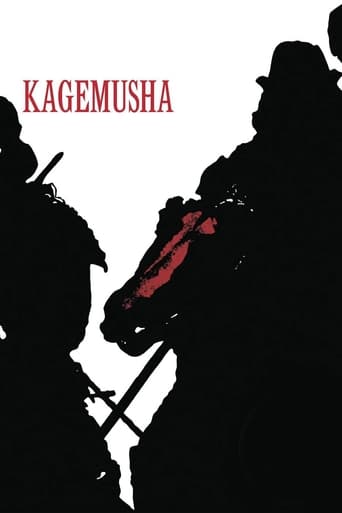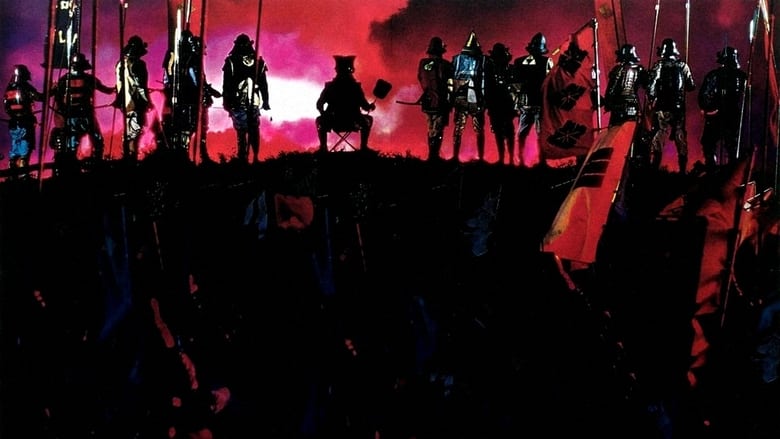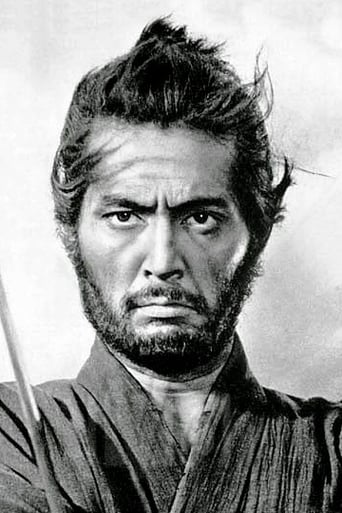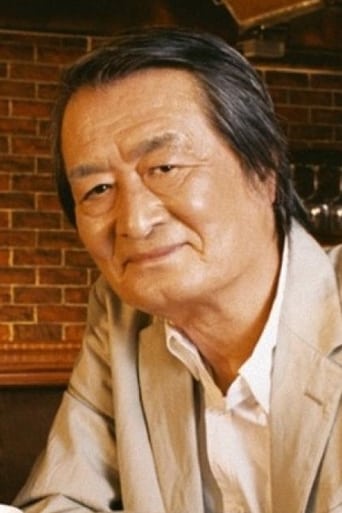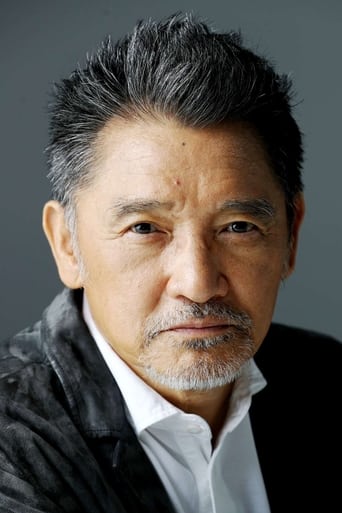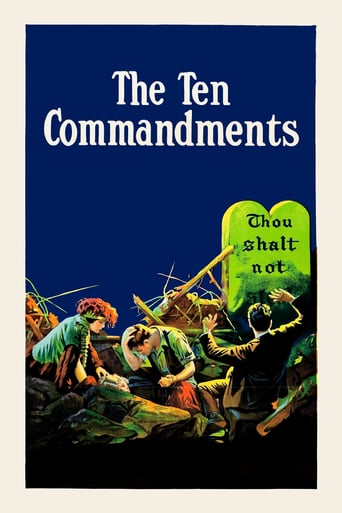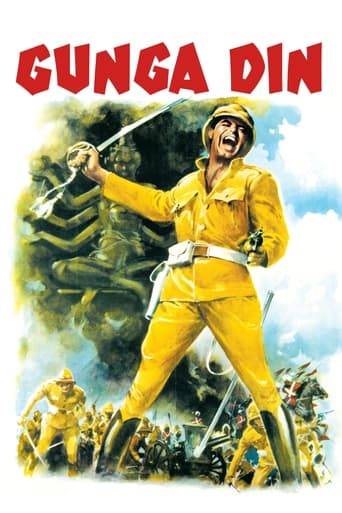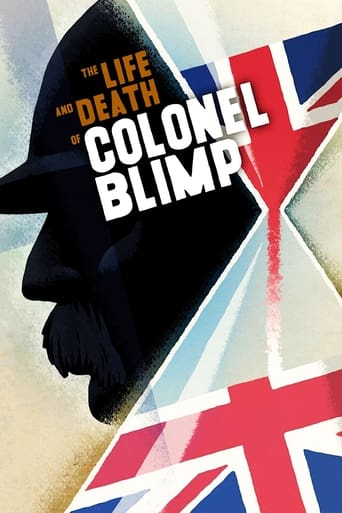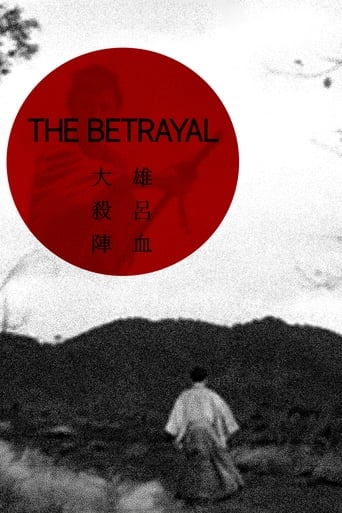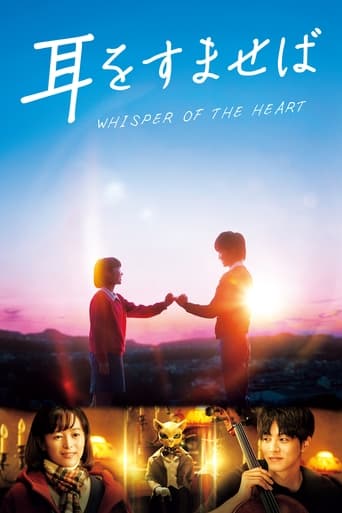Kagemusha (1980)
Akira Kurosawa's lauded feudal epic presents the tale of a petty thief who is recruited to impersonate Shingen, an aging warlord, in order to avoid attacks by competing clans. When Shingen dies, his generals reluctantly agree to have the impostor take over as the powerful ruler. He soon begins to appreciate life as Shingen, but his commitment to the role is tested when he must lead his troops into battle against the forces of a rival warlord.
Watch Trailer
Cast


Similar titles
Reviews
i must have seen a different film!!
A Masterpiece!
Excellent and certainly provocative... If nothing else, the film is a real conversation starter.
The plot isn't so bad, but the pace of storytelling is too slow which makes people bored. Certain moments are so obvious and unnecessary for the main plot. I would've fast-forwarded those moments if it was an online streaming. The ending looks like implying a sequel, not sure if this movie will get one
Film Review: "Kagemusha" (1980)Winning the "Palme d'Or" shared with Bob Fosse's "All That Jazz" (1979) on May 23rd 1980 at Cannes Film Festival in its 33rd edition, director Akira Kurosawa (1910-1998) accumulates all his directorial signatures since "Rashomon" (1950) to adapt an originally screen-written masterpiece on thief impersonating a dying king-like figure alongside Japanese moviestars Tsutomu Yamazaki and Tatsuya Nakadai in a legendary double role as medieval warlord Shingen Takeda as the title-given imposter to take his place in a troublesome kingdom to tragic as high-suspense drama indulging ends, when well-researched art directions by ingenious Kurosawa-collaborator production designer Yoshiro Muraki (1924-2009) delivers with visual splendors to be hypnotized from that even international distribution-securing producers George Lucas and Francis Ford Coppola must have admit that "Kagemusha" remains world cinema at its best to be discovered again in an all-too-fast moving environment of speeding visuals from any digital device coming our way these days.Copyright 2018 Cinemajesty Entertainments LLC
"Do not fear when the earthquake comes, and the mountain falls into the sea." - Psalm 46:2On December 22nd, 1971, Akira Kurosawa slid his body into a bathtub and slit his wrists with a blade. He was hospitalised and recovered several weeks later. Biographies differ on how many times Kurosawa slashed himself, but most agree that the 1971 incident was the last of at least a half-dozen other attempts at self-harm or suicide. Why did Kurosawa want to kill himself? Biographies typically offer a cocktail of explanations: depression, existential crises, a family history of suicide (his brother committed suicide in 1933), the critical and financial failures of his recent films and so forth. Whatever the reason, one thing remains clear: the once mighty director had been dethroned, humbled and so forced to reassess his powers, position and life.Similar themes run throughout Kurosawa's "The Shadow Warrior". Released in 1980, it stars Tatsuya Nakadai as Takeda Shingen, a Japanese warlord who rules during the Sengoku period (1460s - 1600s). Nicknamed "the mountain" ("A mountain does not move," Shingen tells his generals), Shingen is feared by all rival warlords. They perceive him as being omnipotent, omniscient and omnipresent. His presence looms menacingly over all of central Japan.But Shingen's begun to confront his own mortality. Making preparations for his death, he's arranged for body-doubles to take his place should he die in combat. These doubles are designed to stave off death, to preserve Shingen, to offer him some semblance of immortality in the face of a Nature expert at dethroning arrogant humans. But will they work?Midway in "Shadow Warrior", Shingen is killed by a sniper's bullet. Kurosawa films this sequence like a police procedural, Shingen's rivals attempting to ascertain how one of their own snipers – a lowly moral – proved capable of downing a God like Shingen. Hilariously, even when all indications point to Shingen having been killed, these rival warlords refuse to believe the evidence. Afterall, mountain's do not fall!Odd for an epic about warlords, "The Shadow Warrior" thus concerns itself not with combat, but with espionage. Every warlord in Japan is busy sending out spies, each desperate for irrefutable evidence that Shingen has fallen. These warlords become increasingly uncertain when Shingen's doubles and generals begin launching attacks on rival kingdoms. Are these attacks proof that Shingen is still alive? Why would Shingen's generals attack others without a mountain on their shoulders?Before he died, Shingen provided his generals with clear instructions: should he be killed, they are to cease attacking rival kingdoms and focus instead on territorial defence. Whilst Shingen's tactical conservatism baffles his generals, they make increasing sense to Kurosawa's audience. Afterall, if the mountain has proved to be fallible, why risk further losses by attacking rivals? More importantly, if all previous certainties have revealed themselves to have rested on sheer belief, on sheer shared delusion, then what other assumptions might be toppled?These issues of "belief" become the chief theme of Kurosawa's final act. Here Shingen's men hold fast to their insane convictions; they are invincible, they are mountains, they are Shingen incarnate, they tell themselves. But of course they are not. And so frauds, impostors, doubles and soldiers die on a battlefield, hundreds slaughtered, arrogance giving way to defeat, egos giving way to death. "The fifty years of a man's life are short compared to that of this world," a character tells us. The film then ends with the corpse of Shingen's double floating down a river. Floating with him is the banner of Shingen's kingdom – the Takeda flag – which speaks of mighty rivers, winds, fires, mountains and soil. These entropic certainties ironically counterpoint the film's frail corpses. In "The Shadow Warrior", downfalls greet all kings, clans, directors, actors and men. To think otherwise is folly. And if to behave differently is fraudulent, all men are impostors."The Shadow Warrior" is the first Kurosawa film that might be termed "Brechtian". The sentimentality and more populist aspects of Kurosawa's previous works are replaced with a distant, dispassionate tone, and most sequences are filmed with stagnant medium and long-shots. Elsewhere metaphysics takes precedent over motion, Kurosawa asks us to examine and ponder the subtleties of each scene, and all characters are held at distance, such that they become faintly absurd. Kurosawa would resurrect this style for his 1985 masterpiece, "Ran", an epic to which "The Shadow Warrior" is often unfairly compared. "The Shadow Warrior" may be flawed – it becomes repetitive, its bloodbaths are oft cheesy rather than profound, and filming in modern Japan forces Kurosawa to rely on claustrophobic exterior shots which hamper the philosophical scope of his picture – but it is nevertheless peppered with many masterful moments. Famously, the film was executive produced by George Lucas and Francis Ford Coppola, who convinced 20th Century Fox to make up the shortfall when the film's original produces, Toho Studios, proved unable to afford the film's completion.8/10 – Worth multiple viewings. See "Ran", "Barry Lyndon" and "The Red and the White".
i saw the film more than a couple of times,i love it..30 years is plenty of time to prove us that movies of today had a lot to learn from this ones...a lot of things had change in the way of making movies..and not necessary good ones.watch this film with a clear mind,not tired,relax..and enjoyed!the strenght of a mountain.. the essence of human.. the shadow of a warrior. everything in this film is wonderful,the images and score music are so powerful.kurosawa give to us another almost perfect piece of art. the scale of battles scenes in this type of movies are huge and the choreography for the warriors and horses is amazing. this is a pleasure to watch. beautiful and timeless
This is the best movie I have ever seen. In any language from any culture. I thought so when I first saw it thirty years ago and I still think so now, despite not being able to see it in its original mind- blowing wide-screen form. It is not just one of the most visually beautiful films ever done. The positive reviews are all accurate, but many focus too much on Kurosawa in general rather than on the particular theme of this film, which is closely tied to Japanese history and ideals, and which unites all the specific beauties of text and technique. This is not simply a film about historical belatedness (a lament that the ancient idea of heroes is now exposed by the modern world to be a hollow fantasy, as Ebert and other suggest), or the Shakespearian tragedy of inevitable discrepancy between individual and historical role, as in Henry V), although the film includes something of these elements. It is more--a beautiful elegy to a positive feudal ideal of leadership that goes beyond individual power to sacrifice for country--embodied in the figure of Takeda Shingin. Great tactician, unsurpassed "rider" of horses and women, inspiring and fearsome military leader, he is also a student of the Sutras and a man who "stepped right into people's hearts," as one of his aides says. The opening scene shows he listens to criticism and has a sense of irony about himself; when the thief who is to play his "double" accuses him of being a murderer, he agrees but says he will do anything to unite the country in order to prevent endless war and bloodshed. The same actor plays the lord and his double with incredible depth and subtlety. Shingin is killed (by a gun) early in the movie; as he is dying he tells his generals not to let anyone know he's dead for three years--to let the thief replace him, so as to give the clan time to prepare for confrontation with the western- armed enemy--and, given that his clan is not armed with western firearms, not to move out of its own territory. The double or "shadow warrior" who takes his place begins to identify with the role and finds out that literal crucifixion (for theft) would have been nothing compared to the loneliness at the top where the weight of the world is on the leader's shoulders. Every moment of his existence requires that he sacrifice everything personal to a role that no one can ever fill perfectly, and that is now bereft of the one man who came closest to doing so. The kagemusha doesn't have Shingin's "riding ability" or his wounds or the depth of self-understanding to fill the lord's role and, when he cockily believes he can do so for a moment, he is discovered and thrown out. Neither he, nor any modern man trying to live an identity larger than himself--including the artist who, like the kagemusha, is creating a shadow of the ideal--can replace this feudal ideal which was superseded (literally, massacred at the end) starting over 400 years ago by Christianized and technologized decadence, represented by Nobunaga and Ieyasu. The kagemusha learns slowly, as we do, what the ABSENCE of the irreplaceable Shingin means to his people and symbolically to Japan. Many scenes build up as if to a great battle or political confrontation, and the generals keep the show going, but it is all hollow--the leader is gone. Shingin's ambitious and over-eager son then leads the Takeda clan out of the mountains--to a destruction by western technology reminiscent of Hiroshima and Nagasaki (especially since the historical battle was at a place named Nagashino). The point of the film is to show a lost ideal of the past which can never be regained and without which everything afterward is a shadow, like the kagemusha ("shadow warrior"). The double (like the artist) seems possessed with Shingen's ghost in the last scenes as he watches in horror while the son, in a self-centered Oedipal frenzy, destroys the flower of his people by moving beyond the legitimate limits of his territory and his scope, and the double can only throw a futile spear at the modern weaponry which destroys him. But a shadow identity from a meaningful past is better than none at all (Kurosawa shores these fragments against modern ruins at least as well as T.S. Eliot in "The Waste Land").

